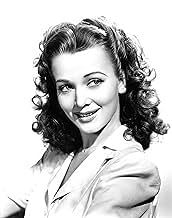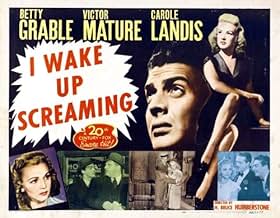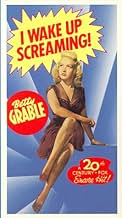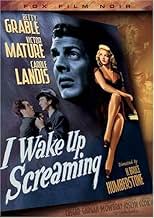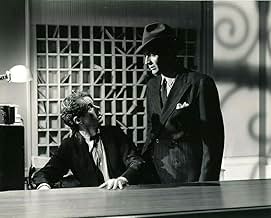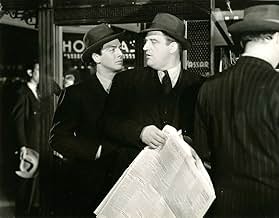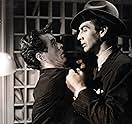IMDb RATING
7.2/10
5.7K
YOUR RATING
Why is Inspector Ed Cornell trying to railroad Frankie Christopher for the murder of model Vicky Lynn?Why is Inspector Ed Cornell trying to railroad Frankie Christopher for the murder of model Vicky Lynn?Why is Inspector Ed Cornell trying to railroad Frankie Christopher for the murder of model Vicky Lynn?
- Director
- Writers
- Stars
- Awards
- 2 wins total
May Beatty
- Lady Handel
- (as Mae Beatty)
Brooks Benedict
- Nightclub Patron
- (uncredited)
Edward Biby
- Nightclub Patron
- (uncredited)
Stanley Blystone
- Police Detective
- (uncredited)
- Director
- Writers
- All cast & crew
- Production, box office & more at IMDbPro
Featured reviews
When the model Vicky Lynn (Carole Landis) is found murdered in her apartment in New York, the promoter of sports Frankie Christopher (Victor Mature) becomes the prime suspect of Inspector Ed Cornell (Laird Cregar) and is brought to the precinct for interrogatory. Christopher discloses how he promoted the career of Vicky when she was a waitress after making a bet with his friends Robin Ray (Alan Mowbray) and Larry Evans (Allyn Joslyn). After reaching the stardom, Vicky tells Christopher that she would leave him to go to Hollywood and on the next day, she was killed. Ed Cornell insists that Christopher is the killer and frames him, and Christopher can only have the support of Vicky's sister, Jill Lynn (Betty Grable), who has fallen in love with him. Who Killed Vicki?
"I Wake Up Screaming" is a film-noir with a story of unrequited love and obsession and "Over the Rainbow" as the music theme (after "The Wizard of Oz" of two years before). Laird Cregar is scary in the role of Inspector Ed Cornell and the final twist surprises and is well resolved. My vote is seven.
Title (Brazil): "Quem Matou Vicki?" ("Who Killed Vicki")
"I Wake Up Screaming" is a film-noir with a story of unrequited love and obsession and "Over the Rainbow" as the music theme (after "The Wizard of Oz" of two years before). Laird Cregar is scary in the role of Inspector Ed Cornell and the final twist surprises and is well resolved. My vote is seven.
Title (Brazil): "Quem Matou Vicki?" ("Who Killed Vicki")
There's a lot to like about this Film Noir: excellent use of shadows (some spectacular patterns), Victor Mature's best acting role, Carole Landis' (who's both a better actress & prettier than Betty Grable) juicy part, Laird Cregar in one of the best scary roles of his too short career, & a strong plot. For cheesecake fans: yes, you do get to see Betty's great legs in a swimming pool scene that seems to have been incorporated into this film for just that purpose. For beefcake fans: yes, you do get to see Victor's chest in the same swimming pool scene. So everyone should have something to be happy about. There's lots of suspects here (five solid ones) to choose from, & I got it wrong, so the film gets an extra point for that. I rate it 9/10.
9dtb
Victor Mature, Betty Grable, and Carole Landis had all been in movies together (mostly musicals) in various combinations, but I WAKE UP SCREAMING (IWUS) was the first film noir all three of them starred in. Maybe that's why IWUS still feels so fresh; everyone in it and everything about it brims with verve and brio, as if all concerned were eager to start filming. Though the movie begins in a NYC police interrogation room (an effective change from the novel's Hollywood setting), IWUS's plot starts more like PYGMALION/MY FAIR LADY than pulse-pounding crime fiction like the Steve Fisher novel the movie's based on. Flashbacks show how promoter Frankie Christopher (Victor Mature), newspaper columnist Larry Evans (Allyn Joslyn), and veteran actor Robin Ray (Alan Mowbray) grab a bite at a Times Square eatery and end up betting they can turn their tart-tongued but beautiful waitress, Vicky Lynn (the incandescent Carole Landis), from a hash slinger to a headliner by getting her name in the papers and her face plastered all over town. It works *too* well: dazzled by her own success, Vicky snares a Hollywood screen test and contract right under her shocked benefactors' noses, only to be murdered on the eve of her Tinseltown departure. Jill finds Frankie standing over Vicky's body, swearing he found her that way. Hotshot Police Inspector Ed Cornell (Laird Cregar) insists Frankie's lying. 15-year veteran Cornell has never been wrong, and he's obsessed with making an example out of hapless Frankie. But does justice alone explain Cornell's zeal, or does he have a hidden agenda? The cat and mouse game is afoot between Frankie, determined to prove his innocence, and Cornell, a smoothly sinister behemoth of a man, ready, willing, and able to go to any lengths to railroad Frankie. Undeterred by the lack of a search warrant, Cornell even sneaks into Frankie's bedroom to watch him while he sleeps ("Someday you're gonna talk in your sleep, and when that day comes, I wanna be around."), doing his damndest to wear Frankie down with smilingly delivered threats and manipulation. With wily Cornell's festering resentment of Frankie, you can't tell what he'll pull next. A formidable, menacing presence, Cregar rocks in the role. His silky voice and charming smile somehow make him even scarier; no wonder IWUS put him on the map. Victor Mature's Frankie is a great match for Cregar's Cornell, with his outer charm and inner toughness. Always an appealing presence, Mature was a better actor than he got credit for, making it look easy. He was hot, too; no wonder Cornell sneeringly calls Frankie "Handsome Harry!" :-) Elisha Cook Jr. is fine as Harry Williams, the oddball switchboard operator and original suspect. (Fun Fact on film historian Eddie Muller's commentary track: Cook filmed his role as THE MALTESE FALCON's Wilmer at the same time he filmed IWUS.)
Things heat up as Jill and Frankie acknowledge what sharp Vicky had already realized: they're in love and eager to protect each other. It's cute and typical of the era to see Jill get starry-eyed when Frankie wants to marry her. It's even cuter when Frankie reveals his original surname as Jill dreamily sighs, "Mrs. Botticelli." Vicky's whirlwind trajectory from waitress to glamour girl to corpse plunges Jill into a world of murder, terror, and obsession, propelling her to flee with the man she loves, dogged by Cornell at every turn. When the plucky Grable's wholesome sexiness meets Mature's playful yet virile allure, it's Chemistry City! Dwight Taylor's screenplay tightens Fisher's sprawling novel almost to the point of claustrophobia (in a good way), with sharp, witty dialogue and comic relief balancing the nerve-racking tension. Taylor's dialogue is snappy, suspenseful, and poignant in all the right places. Loved that "key" exchange early on! Edward Cronjager's lush, expressionistic black-and-white photography is a thing of shadowy beauty, used especially well in Cregar's early scenes as combinations of heavy shadows and bright interrogation lights hide him from view.
Even with studio sets, IWUS evokes early 1940s NYC, even the rooftops. When Frankie shows Jill his old East Side neighborhood, it's fun as both a getting-to-know-you scene and a mini-travelogue of the non-touristy places where native New Yorkers go. This continues when the lovers become fugitives and Frankie shows Jill where to hide in the big city, including the library and a 24-hour grindhouse. Even the swimming pool scene has that spirit; sure, it's there primarily to show off sex symbols Mature and Grable in their swimsuits, but it reminded me of the city's neighborhood pools at their best. One ironic-in-retrospect bit, considering IWUS came out before the U.S. entered World War 2: incensed upon spotting Frankie and Jill dancing so soon after Vicky's murder, Larry calls in a blind item about them, snapping, "Scrap the stuff about the Japanese spy with the Kodak and run this!" Apparent nods to Fisher's pulp roots: 1.) Frankie takes Jill to The Pegasus Club, possibly a shout-out to the novel's narrator/writer hero, nicknamed "Pegasus," a.k.a. "Peg." 2.) During a Cornell/Frankie confrontation, a newsstand features Black Mask Magazine. (This scene gets my vote for cleverest use of a Tootsie Roll.) Finally, according to Muller's commentary, Cornell was named after Fisher's pal and fellow pulpster Cornell Woolrich.
Nice, quirky use of music, too, particularly "Over the Rainbow." Fans of vintage movie music will notice that the opening credits music is the same theme, Alfred Newman's "Manhattan Street Scene," also used in THE DARK CORNER. When Jill brings Frankie home to show him an incriminating letter, listen carefully: in the background, "Over the Rainbow" and "Manhattan Street Scene" cross-pollinate into a sinister new theme, courtesy of music arranger Cyril Mockridge. Ironically, although Mature and Joslyn each have scenes where they awaken with a start, nobody in I WAKE UP SCREAMING ever actually wakes up screaming! How could you wake up to find a huge cop staring at you and *not* scream? :-)
Things heat up as Jill and Frankie acknowledge what sharp Vicky had already realized: they're in love and eager to protect each other. It's cute and typical of the era to see Jill get starry-eyed when Frankie wants to marry her. It's even cuter when Frankie reveals his original surname as Jill dreamily sighs, "Mrs. Botticelli." Vicky's whirlwind trajectory from waitress to glamour girl to corpse plunges Jill into a world of murder, terror, and obsession, propelling her to flee with the man she loves, dogged by Cornell at every turn. When the plucky Grable's wholesome sexiness meets Mature's playful yet virile allure, it's Chemistry City! Dwight Taylor's screenplay tightens Fisher's sprawling novel almost to the point of claustrophobia (in a good way), with sharp, witty dialogue and comic relief balancing the nerve-racking tension. Taylor's dialogue is snappy, suspenseful, and poignant in all the right places. Loved that "key" exchange early on! Edward Cronjager's lush, expressionistic black-and-white photography is a thing of shadowy beauty, used especially well in Cregar's early scenes as combinations of heavy shadows and bright interrogation lights hide him from view.
Even with studio sets, IWUS evokes early 1940s NYC, even the rooftops. When Frankie shows Jill his old East Side neighborhood, it's fun as both a getting-to-know-you scene and a mini-travelogue of the non-touristy places where native New Yorkers go. This continues when the lovers become fugitives and Frankie shows Jill where to hide in the big city, including the library and a 24-hour grindhouse. Even the swimming pool scene has that spirit; sure, it's there primarily to show off sex symbols Mature and Grable in their swimsuits, but it reminded me of the city's neighborhood pools at their best. One ironic-in-retrospect bit, considering IWUS came out before the U.S. entered World War 2: incensed upon spotting Frankie and Jill dancing so soon after Vicky's murder, Larry calls in a blind item about them, snapping, "Scrap the stuff about the Japanese spy with the Kodak and run this!" Apparent nods to Fisher's pulp roots: 1.) Frankie takes Jill to The Pegasus Club, possibly a shout-out to the novel's narrator/writer hero, nicknamed "Pegasus," a.k.a. "Peg." 2.) During a Cornell/Frankie confrontation, a newsstand features Black Mask Magazine. (This scene gets my vote for cleverest use of a Tootsie Roll.) Finally, according to Muller's commentary, Cornell was named after Fisher's pal and fellow pulpster Cornell Woolrich.
Nice, quirky use of music, too, particularly "Over the Rainbow." Fans of vintage movie music will notice that the opening credits music is the same theme, Alfred Newman's "Manhattan Street Scene," also used in THE DARK CORNER. When Jill brings Frankie home to show him an incriminating letter, listen carefully: in the background, "Over the Rainbow" and "Manhattan Street Scene" cross-pollinate into a sinister new theme, courtesy of music arranger Cyril Mockridge. Ironically, although Mature and Joslyn each have scenes where they awaken with a start, nobody in I WAKE UP SCREAMING ever actually wakes up screaming! How could you wake up to find a huge cop staring at you and *not* scream? :-)
I Wake Up Screaming is an odd and oddly satisfying film. It is in the noir mold but it's a little earlier than most. The studio that made it was not noted for making thrillers, and the stars,--Victor Mature, Betty Grable and Carole Landis--were not the types one would expect to find in this sort of dark movie. Yet it is fun from the start to finish, and at times creepy, thanks mostly to the presence of Laird Cregar as a cop determined to nail Mature for the murder of a heartless showgirl that he, Cregar, was himself infatuated with. The studio New York of the film is much less intimidating than one might expect in a mystery, and overall the tone is bright and bouncy,--call it noir light. But it's Mr. Cregar who makes the film work. He dominates the picture as soon as he enters it with an authority and sense of himself that most actors would kill for. Cregar was, in short, a genius. The supporting cast, which includes Allyn Joslyn and Alan Mowbray, make the best of their lines, which are often quite witty, and the script is, overall, far better than average.
Despite Victor Mature's claim that he never 'acted' in any of his films, he does well enough here. Full of shadows, sly humour and a storyline which keeps you guessing, plus that wonderful soundtrack (including snatches of Over The Rainbow), this stands as a monument to film noir - Betty Grable could clearly handle a non-musical role, Elisha Cook Jnr displays his twitchy vulnerability as he would in so many 40s thrillers. The real-life early deaths of Landis (playing Vicki here in a manner which reminded me of Vivien Leigh's Blanche Dubois, all flirty giggles) and Cregar (superb here as the corrupt detective gliding and purring in that unusual voice like a huge cat) do affect viewings of this film and give the proceedings a hint of sadness. This aside, there is much to enjoy, particularly in the supporting characters of Mature's actor and columnist friends. One niggle though, given the plot dependence on various people letting themselves into other people's apartments, how come Vicki got herself locked out?
Did you know
- TriviaThe writers used the name "Cornell" for the obsessive cop played by Laird Cregar, a tribute to noir writer Cornell Woolrich.
- GoofsJill's new address is apartment F, but when Cornell visits, the door is clearly marked 3B.
- Quotes
Ed Cornell: I'll follow you into your grave. I'll write my name on your tombstone.
- Crazy creditsOn BBC Two UK broadcasts, the 20th Century Fox logo does not appear at the beginning; instead there's an opening credit saying "Twentieth Century-Fox Presents".
- ConnectionsEdited into I Wake Up Screaming: Deleted Scene (2006)
- SoundtracksStreet Scene
(uncredited)
Music by Alfred Newman
[Played over main titles, then heard as background music throughout the movie]
- How long is I Wake Up Screaming?Powered by Alexa
Details
- Release date
- Country of origin
- Language
- Also known as
- I Wake Up Screaming
- Filming locations
- Nu Pike Amusement Park, Long Beach, California, USA(swimming pool)
- Production company
- See more company credits at IMDbPro
Box office
- Budget
- $462,000 (estimated)
- Runtime
- 1h 22m(82 min)
- Color
- Aspect ratio
- 1.37 : 1
Contribute to this page
Suggest an edit or add missing content


